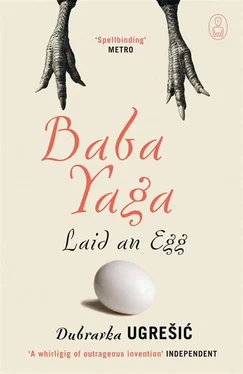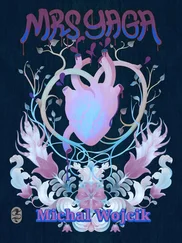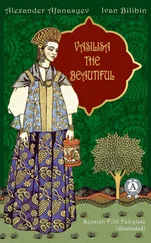Baba also turns up in the names of illnesses ( babice, bapke, babushki, babuha, babile, etc.). In Bulgaria, Baba Šarka is a folk name for measles. Baba Šarka is homeless, footloose and gluttonous. When she turns up in someone’s home, nobody is allowed to prepare any food for nine days. Then Baba Šarka abandons the inhospitable house to look for somewhere more generous. Baba Drusla and Baba Pisanka also bring sickness into the house.
Baba is also connected with the popular concept of time. Baba Marta personifies the third month of the year, especially in Bulgaria, but also in Serbian and Macedonian folklore. In Croatia and Serbia, Baba Korizma (Lent) walks with seven sticks, and she throws away a stick for every week of fasting. In Serbia, snowy days in March are called ‘baba’s days’, ‘baba’s billy-goats’ or ‘baba’s kids’. In Romania and Ukraine, Baba Jaudocha (also Jeudocha or Dokia) is accountable for all wintery precipitations. Snow falls when she shakes her fur coat. Many regions have a carnival custom of ‘burning the baba’. In Croatia, people mark New Year’s Eve symbolic ally by burning a doll, called Baba Krnjuša, so that the new year can take her place.
In Slavic folklore, astronomical and meteorological phenomenaare also named after baba. Moonlight is called ‘Mother Moonshine’, and the moon itself is ‘Baba Gale’. ‘Baba’s belt’ is a metaphor for rainbow, and ‘baba’s millet’ for hail. Bad weather usually comes out of ‘baba’s smock’ in the sky. In Poland, when there are dark spots on the moon, people say ‘Baba is churning butter’ or ‘Baba’s baking bread’. When it is rainy and sunny at the same time, Polish children chant ‘Rain is falling, sun is shining, Baba Yaga’s butter’s churning’. When the first snow falls, the Casubians say ‘The old woman has gone to the dance’. Carpathian farmers use the expression ‘the old woman is freezing cold’ to describe the high mountains dusted with the first snow. In time of drought, Polish peasants believe that an old witch is squatting in an oak tree (meaning, in a nest), keeping eggs warm and that the drought will go on until the chicks hatch. In Bulgarian folklore, baba is a picturesque synonym for day and also for night. [13] ‘They approached the hearth where they found two old grannies with two balls of wool: one was winding the wool, the other unwound it. The one who was winding was day, and the other was night.’
So, lots of things are called baba. In Slavic harvest festivals, the last sheaf is called the baba, and the peasants celebrate the end of harvest by dressing this sheaf in women’s clothes. One kind of mushroom is called a baba, in Slavic languages, as is a butterfly, two kinds of fruit (a pear and a cherry), a cake or pastry (called babka in Polish) and a fish. Baba crops up in the names of mountains, towns and villages (Velika Baba, Mala Baba, Stara Baba, Babina Greda, etc.). ‘Baba’s summer’ is a colloquial expression for a long mild autumn, an Indian summer.
Many Bulgarian sayings are linked with the word baba . The expression ‘There’s one thing baba knows, and she never stops saying it’ is used for someone who is forever telling you the same thing. ‘Baba’s fiddle-faddle’, ‘baba’s babbling’: these are synonyms for nonsense, silliness. There are similar sayings in the language of the Croats, Bosnians and Serbs. ‘There went the old woman with the cakes’ is a saying that refers to a missed opportunity. ‘Baba wants what baba dreams’ is a saying with unambiguous sexual connotations, but it means that when somebody mentions something, that’s what they’re hoping for, which is, in fact, a popular equivalent of Freud’s theory of parapraxis. ‘The old woman’s busy fiddling and faddling’ ( Trla baba lan da joj prođe dan ) is what people say when somebody fritters away their time, loafing around or being pointlessly active. Mixing ‘old women and frogs’ ( babe ižabe ) means mixing things that would otherwise have no connection with each other. ‘Any old woman can do that’, or ‘even my old woman can do that’, means that anybody can do whatever it is, even the most incompetent person. ‘Whatever grannie says, she only talks about cakes’ is another way of referring to somebody who won’t stop talking about the same thing. ‘Too many midwives, crippled child’ means that too many cooks spoil the broth. ‘If grandma had balls, she’d be grandpa’ is another saying. At the same time, babo or baba means father in some languages (Farsi, Arabic, Turkish, Italian), but it can also refer to an older male member of the family, any old man or a holy man.
* * *
All things considered, the Slavic world is positively teeming with babas! On the other hand, let us not forget that all these ugly, sexist notions, proverbs, sayings and beliefs involving ‘grandmas’ were thought up by ‘grandpas’. Who, naturally, reserved the more heroic parts for themselves.
Baba Yaga, along with her innumerable variants in Russian, Ukrainian, Belarusian (Igaya, Iga, Yega, Yagaba, Yagabova, Egabova, Egibitsa, Yegiboba, Yaganishna, Yagivovna, Yagichina-Babichina, Yaga-bura, Egibishna, Yagishna, Yega, Lyaga, Oga, Aga Gnishna, Yagabaka), and in other Slavic languages (Indži-baba, Ježibaba, Jedibaba, Jedubaba, Babaroga), is a female anthropomorphic being, an old hag-cum-sorceress, a witch. There have been many interpretations of her name. Some authors hold that Jagok, Egga, Iga, Yuga, Yazya, Yaza, Yeza, Yagishna, Ajshi-baba, and other similar designations all have a single Old Slavonic stem: ega or esa, which is close to the Lithuanian engti and the Latvian igt, and which mean, approximately, evil, horror, nightmare, sickness.
Baba Yaga lives in a forest, or on the edge of a forest, in a cramped little hut that stands on hen’s legs and turns around on the spot. She has one skeleton-leg (‘Baba Yaga, bony leg!’), dangling breasts that she dumps on the stove or hangs over a pole, a long sharp nose that knocks against the ceiling ( nos v potolok ros ), and she flies around in a mortar, rowing herself through the air with a pestle, wiping away her traces with a broom.
* * *
Baba Yaga is a unique oral–textual ‘patchwork’ of folklore and mythico-ritual traditions (shamanism, totemism, animism, matriarchy), and her status, function and authority change from tale to tale, from one zone of folklore to another, from male story-tellers to female. Baba Yaga is a text that is read, studied, told, adapted, interpreted and reinterpreted differently at different times.
Baba Yaga’s origins are not all that clear. One theory has it that she was the Great Goddess, the Earth Mother herself. Another, that she was the great Slavic goddess of death ( Yaga zmeya bura ); a third, that she was the mistress of all the birds (hence the hut on hen’s legs and the long nose like a beak); a fourth theory has it that she was a rival of the Slavic goddess Mokosh, and that she evolved over time from a great goddess into an androgyne, then into the goddess of birds and snakes, and then into an anthropomorphic being, until she finally acquired female attributes. Some associate her with the Golden Baba, an archaic goddess from the age of matriarchy, and they see the hen’s legs beneath her hut as the vestige of a fertility cult.
Baba Yaga appears as a spinner and weaver, roles which always symbolise power over human destiny (Baba Yaga gives the heroes a ball of thread that will lead them to their goal), but also as a warrior who sleeps with a sword over her head and fights against knights (sometimes she appears as a mother of dragons). In some tales, Baba Yaga has power to turn people to stone (like the Medusa); in others, power to command the forces of nature: winds, tempests and thunder (which is why she is sometimes associated with the Slavic god Perun). Vladimir Propp, whose influence in this field of research has been immense, holds that Baba Yaga is the mistress of all the forest fauna, of the world of the dead, and also the priestess of initiations.
Читать дальше












